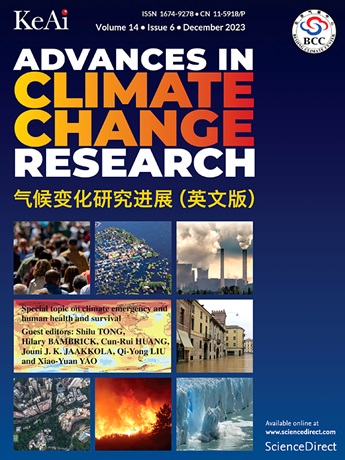Climate impacts on the supply–demand balance of China’s wind–solar energy system based on power grid transmission during the summer peak-load period
IF 5.2
1区 地球科学
Q1 ENVIRONMENTAL SCIENCES
引用次数: 0
Abstract
As China transitions towards a greener energy mix, especially using wind and solar energy, the reliability and stability of its renewable energy system, heavily reliant on grid transmission, face substantial challenges posed by climate variability. During summer peak-load periods, high temperatures exacerbate strain on electricity supply–demand dynamics. This study defines a power supply and demand gap (PSDG) index and investigates the intricate relationship between climate change and the supply‒demand balance of China’s renewable energy system, focusing specifically on the role of power grid transmission. Results show that electric power transmission can effectively mitigate climate-related risk, reducing it by an average of 5.3%. However, climate change poses a substantial threat to future energy supply‒demand balance, with meteorological variations potentially intensifying the frequency and severity of extreme operating conditions. Sensitivity analysis results indicate that supply-side and demand-side aspects account for 55% and 45% of the total PSDG index variation, respectively. We propose that energy planners in regions such as Hebei and Inner Mongolia, where climate change adversely impacts the PSDG index, should adapt their strategies to accommodate the consequences of climate change on wind–solar energy systems. This adaptation necessitates a comprehensive understanding of how varying climatic conditions affect the performance and reliability of renewable energy sources, thereby enabling the development of resilient and sustainable energy infrastructures.
气候对夏季高峰负荷期中国电网输电网风电系统供需平衡的影响
随着中国向绿色能源结构转型,特别是利用风能和太阳能,严重依赖电网传输的可再生能源系统的可靠性和稳定性面临气候变化带来的重大挑战。在夏季高峰负荷期间,高温加剧了电力供需动态的紧张。本文定义了电力供需缺口(power supply and demand gap, PSDG)指数,探讨了气候变化与中国可再生能源系统供需平衡之间的复杂关系,重点研究了电网传输的作用。结果表明,电力传输可以有效降低气候相关风险,平均降低5.3%。然而,气候变化对未来的能源供需平衡构成了重大威胁,气象变化可能会加剧极端运行条件的频率和严重性。敏感性分析结果表明,供给侧和需求侧分别占总PSDG指数变化的55%和45%。我们建议,在气候变化对PSDG指数产生不利影响的河北和内蒙古等地区,能源规划者应调整其战略,以适应气候变化对风能-太阳能系统的影响。这种适应需要全面了解变化的气候条件如何影响可再生能源的性能和可靠性,从而促进有弹性和可持续的能源基础设施的发展。
本文章由计算机程序翻译,如有差异,请以英文原文为准。
求助全文
约1分钟内获得全文
求助全文
来源期刊

Advances in Climate Change Research
Earth and Planetary Sciences-Atmospheric Science
CiteScore
9.80
自引率
4.10%
发文量
424
审稿时长
107 days
期刊介绍:
Advances in Climate Change Research publishes scientific research and analyses on climate change and the interactions of climate change with society. This journal encompasses basic science and economic, social, and policy research, including studies on mitigation and adaptation to climate change.
Advances in Climate Change Research attempts to promote research in climate change and provide an impetus for the application of research achievements in numerous aspects, such as socioeconomic sustainable development, responses to the adaptation and mitigation of climate change, diplomatic negotiations of climate and environment policies, and the protection and exploitation of natural resources.
 求助内容:
求助内容: 应助结果提醒方式:
应助结果提醒方式:


